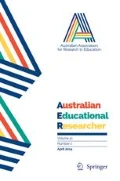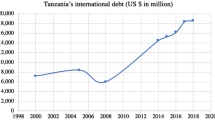Abstract
Financial literacy education (FLE) continues to gain momentum on a global scale. FLE is often described as essential learning for all citizens, despite the bulk of initiatives outside the compulsory school classrooms focussed on educating economically disadvantaged individuals. Informed by Indigenous ways of knowing, being and doing a critical discourse analysis of FLE facilitators resources used in train-the-trainer workshops in/for a Canadian Aboriginal community was conducted to identify dominant discourses. An uncomfortable space was uncovered as the ubiquitous focus on individual wealth accumulation contradicted Indigenous ways of knowing, being and doing, underscoring the challenges of embedding Indigenous epistemologies in highly institutionalised charitable organisations’ attempts to help Indigenous (and non-Indigenous) peoples in poverty. Although this research is based on a Canadian program, the explosion of FLE as a “solution” to collective problems such as poverty lends itself to other—including Australian—contexts.
Similar content being viewed by others
References
Arthur, C. (2016). Financial literacy education as a public pedagogy: consumerizing economic insecurity, ethics and democracy. In Aprea et al. (Eds.), International Handbook of Financial Literacy. (pp. 113–12). Singapore: Springer.
Australian Curriculum (2016). Mathematics curriculum. Retrieved from: http://v7-5.australiancurriculum.edu.au/mathematics/curriculum/f-10?layout=1.
Australian Government (2011). Stronger Futures in the Northern Territory. Report on Consultations. Retrieved from: https://www.dss.gov.au/sites/default/files/.../09.../strongerfutures-consult_171011.rtf.
Bielefeld, S. (2012). Compulsory income management and indigenous Australians: delivering social justice or furthering colonial domination. University of New South Wales Law Journal, 35(2), 522–562.
Blue, L.E. (2016). Exploring the practices in a Canadian aboriginal community: A case study. PhD Dissertation. Griffith University.
Blue, L. E., Grootenboer, P., & Brimble, M. (2014). Financial literacy education in the curriculum: making the grade or missing the mark? International Review of Economics Education, 16, 51–62.
Blue, L. E., Grootenboer, P., & Brimble, M. (2015). The importance of praxis in financial literacy education: An Indigenous perspective. In M. Marshman, V. Geiger, & A. Bennison (Eds.), Mathematics Education in the Margins: research guided practice, proceedings of the 38th annual conference of the mathematics education research group of Australasia (pp. 117–124). Sunshine Coast: MERGA.
Bray, JR, Gray, M., Hand, K., & Katz, I. (2014). Evaluating New Income Management in the Northern Territory: Final Evaluation Report. SPRC Report 25/2014. Sydney: Social Policy Research Centre.
Brimble, M., & Blue, L. E. (2015). A holistic approach to financial literacy education. ACRN Journal of Finance and Risk Perspective, 4(3), 34–47.
Collins, S. (2012). 21 September). New Zealand Herald: Teen welfare hard for guinea pigs.
Danes, S. M., Garbow, J., & Jokela, B. H. (2016). Financial management and culture: the American Indian Case. Journal of Financial Counseling and Planning, 27(1), 61–79. doi:10.1891/1052-3073.27.1.61.
Demosthenous, C., Robertson, B., Cabraal, A., & Singh, S. (2006). Cultural identify and financial literacy: Australian Aboriginal experiences of money and money management. Paper presented at the Financial Literacy, Banking and Identity Conference, RMIT University.
Dowler, E. (1997). Budgeting for food on a low income: the case of lone parents. Food Policy, 22, 405–417.
Dowler, E. (2008). Symposium on ‘Intervention policies for deprived households’ Policy initiatives to address low-income households’ nutritional needs in the UK. Proceedings of the Nutrition Society, 67(03), 289–300.
Fairclough, N. (1992). Discourse and Social Change. Cambridge: Polity Press.
Fairclough, N. (2001). Language and Power (2nd ed.). England: Pearson Education Limited.
Fernandes, D., Lynch, J. G., & Netemeyer, R. G. (2014). Financial literacy, financial education, and financial behaviours. Management Science, 60(8), 1861–1883.
Fletcher, M., Hanna, K., & Anderson, D. (2013). The introduction of compulsory income management into New Zealand’s Social Security System: The case of the youth service package, paper presented at the labour, employment and work in New Zealand Conference, 27–28 November, Victoria University of Wellington.
Forté, K. S. (2014). Sociocultural issues in adult financial education. In K. S. Forté, E. W. Taylor, & E. J. Tisdell (Eds.), Financial literacy and adult education (pp. 5–13). San Francisco: Jossey-Bass.
Freire, P. (1993). Pedagogy of the oppressed. New York: Continuum.
Freire, P., & Macedo, D. P. (1987). Literacy: Reading the word & the world. South Hadley: Bergin & Garvey.
Humpage, L. (2016). Income management in New Zealand and Australia: differently framed but similarly problematic for Indigenous people. Critical Social Policy, 36(4), 1–21.
Kemmis, S., Wilkinson, J., Edwards-Groves, C., Hardy, I., Bristol, L., & Grootenboer, P. (2014). Changing practices, changing education. Singapore: Springer.
Lahn, J. (2012). Poverty, work and social networks: the role of social capital for Aboriginal people in urban Australian locales. Urban Policy and Research, 30(3), 293–308. doi:10.1080/08111146.2012.673483.
Lea, S. E. G., Webley, P., & Levine, R. M. (1993). The economic psychology of consumer debt. Journal of Econmic Psychology, 14, 85–119.
Lucey, T. A., Agnello, M. F., & Laney, J. D. (2015). A critically compassionate approach to financial literacy: Sense Publishers.
Lucey, T. A., & Laney, J. D. (2012). Using art and community investigation to motivate learning and teaching of social and economic/financial justice issues. In T. A. Lucey & J. D. Laney (Eds.), Reframing financial literacy: exploring the value of social currency. North Carolina: Information Age Publishing Inc.
Lusardi, A. (2015). Financial literacy skills for the 21st century: evidence from PISA. Journal of consumer affairs, 49, 639–659. doi:10.1111/joca.12099.
Lusardi, A., & Mitchell, O. S. (2013). The economic importance of financial literacy: theory and evidence. Cambridge: National bureau of economic research.
Lyons, A. C., Chang, Y., & Erik, M. (2006). Translating financial education into behavior change for low-income populations. Journal of Financial Counseling and Planning, 17(2), 27.
Martin, K. L. (2003). Ways of Knowing, Ways of Being and Ways of Doing: a theoretical framework and methods for Indigenous re-search and Indigenist research. Voicing Dissent, New Talents 21C: next Generation Australian Studies. Journal of Australian Studies, 76, 203–214.
Martin, K. L. (2008). Please knock before you enter: Aboriginal regulation of outsiders and the implications for researchers. Teneriffe: Post Pressed.
Maverick, J.B. (2015). The 3 biggest Canadian Banks (RY, TD). Retrieved from: http://www.investopedia.com/articles/investing/082015/3-biggest-canadian-banks.asp.
MoneyMinded (2013). Financial skills for the future. Retrieved 5 June 2013 from http://www.moneyminded.com.au/about/default.asp.
Organisation for Economic and Cooperative Development (OECD). (2014). PISA 2012 Results: Students and Money (Volume VI): Financial literacy Skills for the 21st Century. PISA: OECD Publishing.
Organisation for Ecoominic and Cooperative Development (OECD). (2013). Financial Literacy Framework. In PISA 2012 Assessment and Analytical Framework: Mathematics, Reading, Science, Problem Solving and Financial Literacy: OECD Publishing. doi: http://dx.doi.org/10.1787/9789264190511-7-en.
Pettigrew, N., Webb, C., & Ganesh, G. (2005). The discretionary social fund and money management (No. 241). Corporate Document Services.
Pinto, L. E. (2009). Is Financial Literacy Education the Solution to Credit Crises? Our Schools, Our Selves, 18(4), 123.
Pinto, L. E., & Blue, L. E. (2015). Pushing the entrepreneurial prodigy: canadian Aboriginal entrepreneurship education initiatives. Critical Studies in Education. doi:10.1080/17508487.2015.1096291.
Pinto, L. E., & Coulson, E. (2011). Social justice and the gender politics of financial literacy education. Journal of the Canadian Association for Curriculum Studies, 9(2), 54–85.
Pinto, L. E., & Cresni, L. (2014). Mythology, moral panic, and the Ruby Payne Bandwagon. Our Schools/Our Selves, 23(5), 43–54.
Propser Canada (2016a). Financial literacy facilitator resources. Retrieved from: http://prospercanada.org/Resources/Financial-Literacy-Facilitator-Resources.aspx.
Prosper Canada (2016b) Financial empowerment. Retrieved from: http://prospercanada.org/Financial-Empowerment/Overview.aspx.
Prosper Canada (2016c). Financial empowerment. Improving financial outcomes for low-income households. Retrieved from: http://prospercanada.org/prospercanada/media/PDF/Publications/Financial-Empowerment-Brochure.pdf.
Propser Canada (2016d). First Nations Financial Wellness Project. Retrieved from: http://prospercanada.org/Our-Work/Centre-for-Financial-Literacy/First-Nations-Financial-Wellness-Project.aspx.
van Dijk, T. A. (1985). Handbook of discourse analysis. In Discourse and dialogue. London: Academic Press.
van Dijk, T. A. (1993). Principles of critical discourse analysis. Discourse and Society, 4(2), 249–283.
van Dijk, T. A. (2001). Critical discourse analysis. In D. Tannen, D. Schiffrin, & H. Hamilton (Eds.), Handbook of Discourse Analysis (pp. 352–371). Oxford: Blackwell.
Wilson, S. (2001). What is an Indigenous Research Methodology? Canadian Journal of Nation Education, 25(2), 175–180.
Wilson, S. (2008). Research is ceremony: Indigenous research methods. Manitoba: Fernwood.
Acknowledgements
The first named author would like to thank the Fellowship Fund Inc. of Graduate Women Queensland for awarding her with the inaugural Molly Budtz-Olsen 3-year Fellowship during her PhD candidature.
Author information
Authors and Affiliations
Corresponding author
Rights and permissions
About this article
Cite this article
Blue, L.E., Pinto, L.E. Other ways of being: challenging dominant financial literacy discourses in Aboriginal Context. Aust. Educ. Res. 44, 55–70 (2017). https://doi.org/10.1007/s13384-017-0226-y
Received:
Accepted:
Published:
Issue Date:
DOI: https://doi.org/10.1007/s13384-017-0226-y




